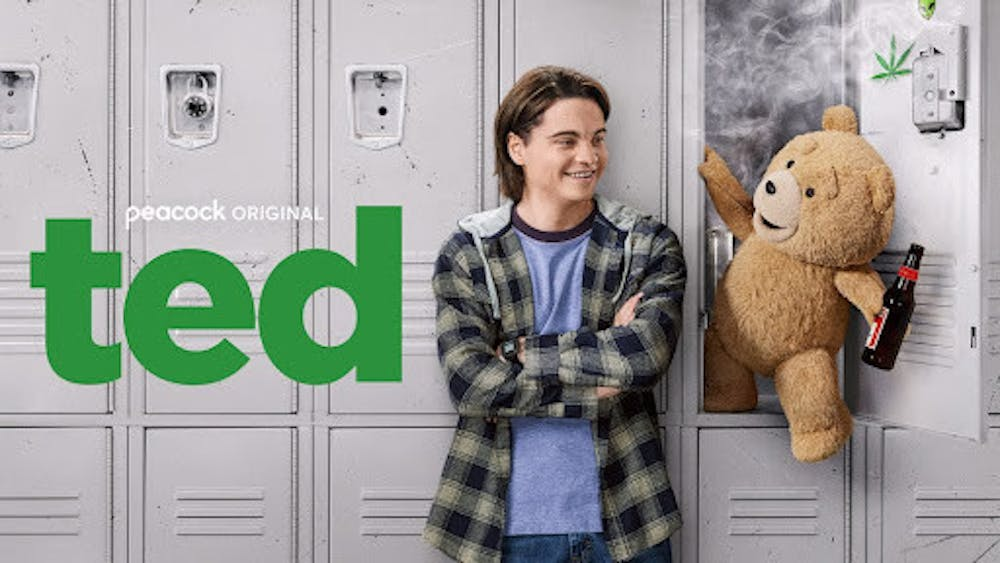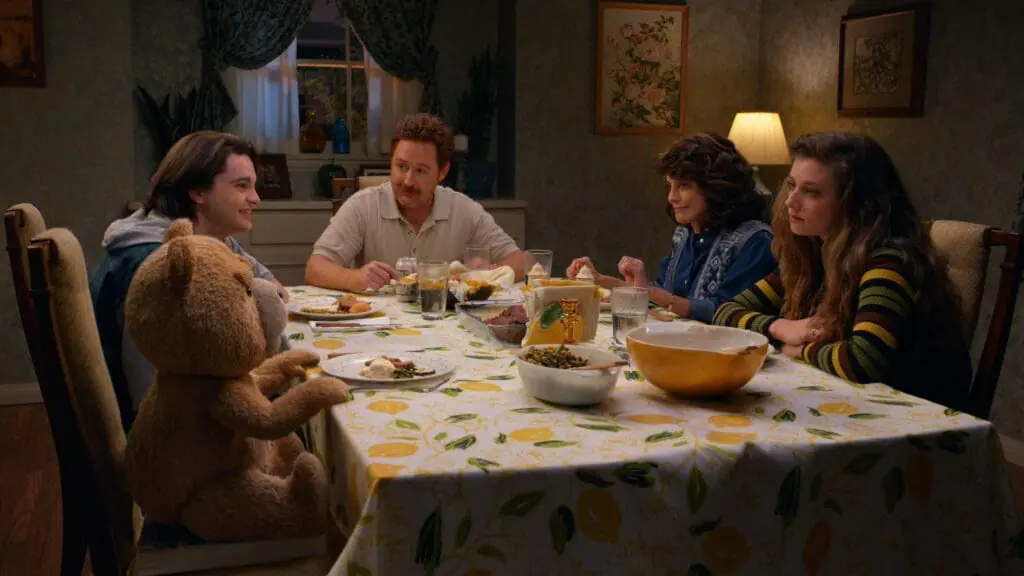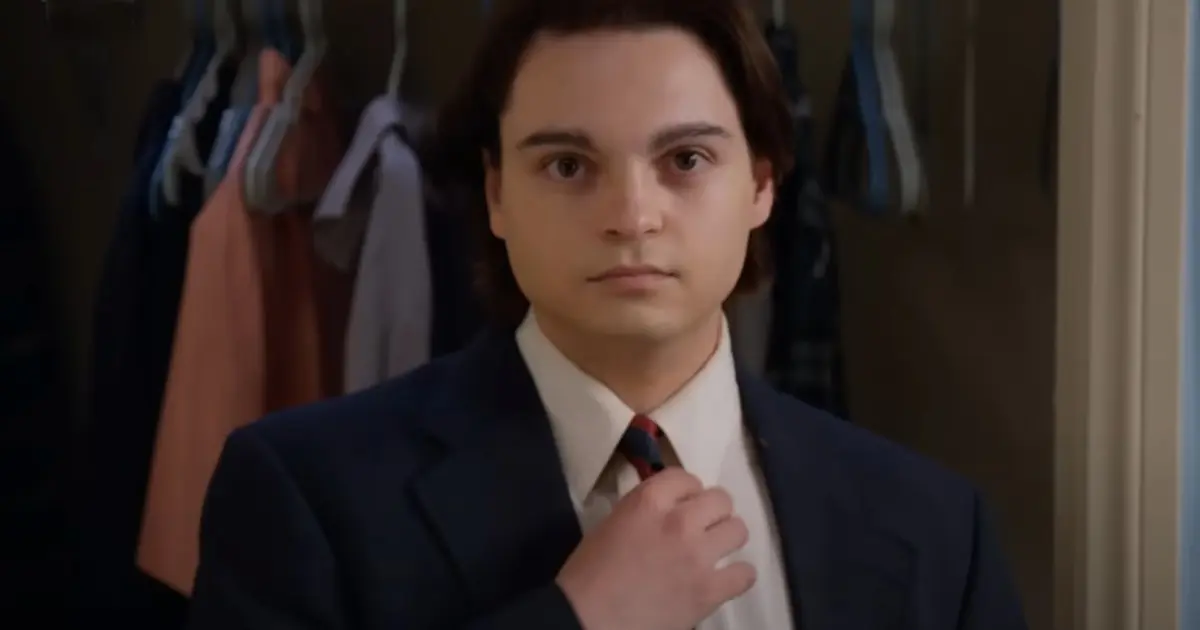Exploring the Family Dynamics of the Ted Show
If you had told me a few years ago that I would be nonstop raving about a Ted TV show in 2024, I would've looked at you and said, "Who gives a fuck about Ted??" Yet here I am, still reeling from the shockingly great series that I stumbled across by sheer boredom.
Over winter break earlier this year, I had a lot of free time that I didn't have anything to do with. This led me to rot on the living room couch and mindlessly scroll through Peacock Plus since I had already watched everything good on Netflix. That's when I came across the Ted show, and despite having not seen either of the Ted movies beforehand, I was compelled to give the show a try because of a viral Twitter clip I had seen from the show that made me chuckle.
But even halfway through the first episode, I could tell that I was locked into this experience. The comedy, characters, and storytelling was incredible for my low expectations from the show, and it compelled me to binge the entire 8 episode run within two days, staying up until 4 AM one night because I simply couldn't stop watching it. Exceeding any and all expectations, I had discovered one of the most subversive, well-written TV shows I had watched in years- I hadn't laughed this hard unapologetically since watching Arrested Development years ago, which I considered my favorite show of all time.
Ever since my first watch of the series, I have been nonstop recommending it to anyone who would listen to me: my roommate, my partner, and any of my friends with nothing better to watch. At the time of writing, I am currently on my FOURTH rewatch of the show- I am thoroughly infatuated with the writing and sheer comedic genius of Ted. I figured this would be a great topic to write about on the blog, so here's my breakdown of why I love the Ted show so much.
First and foremost, I wanted to start by taking a look at each member of the main cast, the Bennett Family. Each member, whether it be Matty, the bigoted patriarch of the family, the sweet and soft-spoken Susan, or the college liberal Blaire, has their own unique comedic style and characterization that elevates them from the cookie-cutter archetypes they embody into real fleshed-out people that the audience is able to identify with.
The titular Ted Bennett is a brash, sarcastic companion to the youngest of the family, John. While the show is named after Ted, and general audiences are most familiar with him from his movies rather than the show, he often takes a sidecar seat to most of the other family members' story arcs, serving as more of a comedic relief than a character that grows throughout the series. When I sat down to watch the show, Ted's jokes were the ones that I laughed the hardest at, but also the ones I expected to laugh at the hardest. His dry sarcasm really tickled my sense of humor, but I also found myself laughing at a lot of slapstick comedy from Ted's character, since he is often kicked around or scrambling around like a little creature, which I hadn't expected to find so funny. Seth MacFarlane's voice acting really sells the character for me- you'd be hard pressed to find a more fitting embodiment of the cynical bear's character and harsh Bostonian accent.
Alongside Ted is John Bennett, who serves as the protagonist for the show's overarching plot, which is centered around making John more popular and comfortable in his high school career. While he does often play off of Ted's sarcastic wit, John tends to have more of a cringe-comedy tinge to his jokes, where he is often the punchline of the jokes the show is making, or the audience is meant to wince at how socially inept he is. However, despite being a complete loser, he does serve as the heart of the show. When other family members like Blaire or Susan suffer from the consequences of John and Ted's antics, he is always trying to make amends or correct his mistakes for their sake rather than saving his own bacon. While at first I didn't really resonate with his character, I found myself understanding and sympathizing with his character a lot, as he really nailed that sort of awkward, well-meaning teenager feeling while still being the sort of dipshit you'd expect of a high school sophomore.
Susan Bennett, the mother of the family, is another character I didn't immediately "get". From the pilot episode, I had understood her to be a very cookie-cutter archetype of the soft-spoken timid housewife who is too naïve to understand the rest of the characters around her. I expected that the majority of the comedy involving her would be centered around her being the victim of the other characters' actions, robbing her of her agency as a character and sort of just filling the role of "mother" for a family of more interesting characters. But throughout the show, the audience comes to understand that she is much more competent than she lets on, and that she is simply a product of society's attitudes towards women at the time the show takes place. I had never expected that Susan would be an honest critique of these women in the 90s who were sidelined to the margins because of society when they were growing up, but still appreciating and celebrating the progressive position of young women in their society.
I really enjoyed how the show subverts the expected trajectory of her character, where in the Susan-centered episode 5, she is encouraged by her family to pursue her old career aspirations to be a teacher. When you watch the episode, the clear path that is seemingly set up for her is that she becomes more independent as a character and embraces her new potential as a modern woman. However, in a twist I honestly didn't expect, she rejects this life at the end of the episode, saying that while she is proud and happy that Blaire is able to realize her potential as an independent woman, it isn't the life she wants anymore, as she is content with her life as a simple housewife, due to how she was raised. Instead of pressuring Susan to pursue a life and potential that doesn't fit how her character was represented so far in the show, Susan instead shows that she is capable of making her own decisions, and that she always had her agency, but she simply preferred a life that was more expected of women of her generation, rather than awkwardly adopting the attitudes of the younger women of the 90s. I thought this was a really interesting and honest depiction of how despite what some people say, some women really do prefer being a housewife, and that there's nothing wrong with making this decision.
On the complete opposite side of the personality spectrum is Matty Bennett, the red-blooded traditional Bostonian patriarch, who fits cleanly into the bigoted, dumb dad archetype that so many sitcoms tend to adopt for their father figures. From his first appearance, he is making insensitive comments, putting down his wife, and chugging his third beer of the night- perfectly illustrating the kind of guy he is. The audience immediately can have two reactions to this sort of extreme character: either hating him with a passion, like some of my friends did on their first watch of the show, or acknowledging him as a brutally realistic depiction of certain men that everyone knows. If you were raised anytime in the last few decades, there's almost a guarantee that there's a Matty in your life, the guy who cares about no one's opinion but his own, and complains about "wokeism" and the such.
And for a while, that is all we see of Matty. He is emblematic of what is holding back society: bigoted, privileged men that refuse to get with the times out of stubbornness. However, slowly but surely, the curtain is pulled back on him, and the audience learns that Matty, just like Susan, is also a product of societal views of the time. And similarly to Susan, he is able to evolve and detach himself from that cookie-cutter archetype and develop as a human being. This is illustrated in episode 6, my personal favorite episode, where Matty's childhood toy truck comes to life in a similar manner to Ted. Here the show draws a parallel between Matty and John as two men who remain childish as a result of their attachment to their childhood toys. But while Ted acts as a venue for John's rebellious, maturing thoughts and actions, Matty's truck represents Matty's bigoted ideology, and embodies a much more extreme and brash version of Matty's personality. It is only after Matty sees how the truck hurts his family that he is able to acknowledge his issues, leading to immense character growth and an episode that really felt touching to me. While the show focuses on comedy, it still has a story to tell about the Bennett family and each member's development. And for whatever reason, Matty's arc really resonated with me (at least, no reason that I'll spoil in this post).
Blaire Bennett, John's college-aged cousin that's staying with his family, is an interesting character on several fronts. While she embodies the sort of virtue-signaling, annoyingly liberal teenage girl archetype that seems to become less and less unrealistic as time passes on, she is more than just a nagging figure that cringes at Ted's insensitive humor. Narratively, she takes the moral guidance role that John's parents can't really fill for him- she's cooler, more experienced, and has John's best interests at heart. However, beyond John, her role in the Bennett family dynamic is crucial to the development of the characters throughout the eight episode season.
While the Bennett's are supposed to represent a stereotypical 90s nuclear household, Blaire comes in as an outsider to the family dynamics and shakes up the foundation of each character's archetype, leading to growth and development from the characters she interacts with. She helps Susan find her voice and stick up for herself when Matty becomes too overbearing and rude, and she also eventually influences Matty to soften up on his bigoted comments and calm down. While Blaire often takes the role of straight woman in terms of comedy with other characters, I think the value she brings to the show's cast is more narrative-centered rather than comedy-focused. She's a pretty static character when compared to the other Bennetts, but I still think she's an interesting character, especially since her personal life is told through subtle lines and occasional hints throughout the show, instead of being told upfront (there is an especially important part of her character that is hinted towards throughout the first 5 episodes).
Overall, I think that the cast is spectacular, both in terms of writing, characterization, and casting. I don't know if there could be better written versions of these characters, as I'm a fan of how each one has a sitcom archetype you would think they'd fit into, only to be brilliant subversions of these types of characters that breathe life and realism into the Bennett family dynamic.
I think I have a particular liking of the family dynamic because it very strongly resembles early ideas for a family dynamic I had written for a short film a few years ago. My early drafts for the Babbage family in my short film "Computer Funeral" include a porn addicted younger son, a virtue-signaling liberal older daughter, a soft-spoken and agreeable mother, and a racist, bigoted conservative father figure. Pretty easy to draw parallels right? The reason I'm fond of these characters and the archetypes they subvert is because it's literally the kind of writing I would do (and did), so it's sort of therapeutic to see that characters that are very similar to ones that I have written can find success and acclaim in the actual industry. It's inspiring to me, and I would sell my soul to work on this kind of show some far off day in the future.
So yeah. Watch the Ted show on Peacock Plus! And if you don't have Peacock Plus (because honestly, who would blame you), please find... alternative mediums to watch this show, because its truly one of the best shows I have had the pleasure of watching in recent years.









Comments
Post a Comment